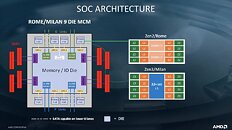Friday, August 28th 2020

AMD Zen 3-based EPYC Milan CPUs to Usher in 20% Performance Increase Compared to Rome
According to a report courtesy of Hardwareluxx, where contributor Andreas Schilling reportedly gained access to OEM documentation, AMD's upcoming EPYC Milan CPUs are bound to offer up to 20% performance improvements over the previous EPYC generation. The report claims a 15% IPC performance, paired with an extra 5% added via operating frequency optimization. The report claims that AMD's 64-core designs will feature a lower-clock all-core operating mode, and a 32-core alternate for less threaded workloads where extra frequency is added to the working cores.
Apparently, AMD's approach for the Zen 3 architecture does away with L3 subdivisions according to CCXs; now, a full 32 MB of L3 cache is available for each 8-core Core Compute Die (CCD). AMD has apparently achieved new levels of frequency optimization under Zen 3, with higher upward frequency limits than before. This will see the most benefits in lower core-count designs, as the amount of heat being generated is necessarily lesser compared to more core-dense designs. Milan keeps the same 7 nm manufacturing tech, DDR4, PCIe 4.0, and 120-225 W TDP as the previous-gen Rome. It remains to be seen how these changes actually translate to the consumer versions of Zen 3, Vermeer, later this year.
Apparently, AMD's approach for the Zen 3 architecture does away with L3 subdivisions according to CCXs; now, a full 32 MB of L3 cache is available for each 8-core Core Compute Die (CCD). AMD has apparently achieved new levels of frequency optimization under Zen 3, with higher upward frequency limits than before. This will see the most benefits in lower core-count designs, as the amount of heat being generated is necessarily lesser compared to more core-dense designs. Milan keeps the same 7 nm manufacturing tech, DDR4, PCIe 4.0, and 120-225 W TDP as the previous-gen Rome. It remains to be seen how these changes actually translate to the consumer versions of Zen 3, Vermeer, later this year.


20 Comments on AMD Zen 3-based EPYC Milan CPUs to Usher in 20% Performance Increase Compared to Rome
Jokes aside: if true in realworld application Intel needs to rev up the marketing machine to unknown heights
Also, i can't wait to see how the unified cache will have an impact for desktops CPU. Not much more cache than the total cache of Zen 2, but the fact that it's shared make it way more probable that the data is in it. I can't wait to see if larger cache will means increased latency.
I mean AMD doing good work in server market is all good, but as a gamer, i want Zen 3 to catch up Intel current offering at the very least. If it doesn't, that will be disapointing for me. But as i have a x570 motherboard, i might anyway get an upgrade if the price are right...
But the 3100x have to do some core to core communication via the infinity fabric where the 3300x don't. The good news is all 8 cores on zen3 will be able to communicate directly, so it will work the same way.
But we will see. Also it's fun to see that people say i'm an Intel fan boy when i have a X570 Motherboard (that imply i am running an AMD CPU). But i don't see why it's so offensive that i want AMD to catch up in gaming performance?
is that a shame? a big no no ?
That concept is strange to me. I hope Zen 3 will beat 10th gen Intel lineup in gaming. I don't see what is the issue there.
An IPC increase post 2020. What
AMD basically needs to outperform Intel in the server space for the next 2 generations in order to gain a significant foothold.
Glory days of 9900K are long gone. It was only good for gaming, if you didn't account for all security patches that brought it back to Quad era, so I really don't get all the hype.There is always room for improvement. Let's hope intel don't go completely kaput. Some competition would be nice.